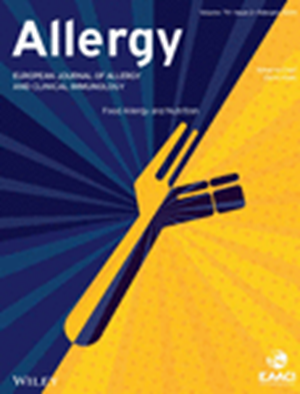Diversity and Dosage Determine the Efficacy of the Probiotic SYN-53 in Allergic Rhinoconjunctivitis: A Randomized, Double-Blind, Placebo-Controlled Trial.
IF 12
1区 医学
Q1 ALLERGY
引用次数: 0
Abstract
SYN-53, a multi-strain probiotic food supplement, was recently shown to significantly alleviate allergic rhinoconjunctivitis (ARC) and its symptoms. The diversity and dosage of bacterial strains administered via SYN-53 have been proposed as key drivers of its efficacy. The aim of this study was to assess the role of bacterial diversity and dosage by comparing SYN-53 to a low dose variant (SYN-53-LD), a low diversity variant (SYN-4), and a placebo in the management of ARC. This double-blind, parallel-group, placebo-controlled clinical trial included subjects with moderate-to-severe grass pollen allergy. Following baseline exposure in an allergen exposure chamber (AEC), 166 subjects were randomized to undergo three weekly 3-day intake cycles of SYN-53, SYN-53-LD, SYN-4, or placebo, followed by a final allergen exposure. During AEC exposure, symptoms were continuously measured via assessment of the Total Symptom Score (TSS). SYN-53 was significantly superior in reducing TSSMAX compared with its low dose variant SYN-53-LD (∆TSSMAX [Mean ± SE]: -5.19 ± 0.80 vs. -2.27 ± 0.65; p = 0.0372), its low diversity variant SYN-4 (-3.41 ± 0.52; p = 0.0482), and placebo (-2.82 ± 0.78; p = 0.0329). No significant differences to placebo were seen for either SYN-53-LD (p = 0.7377) or SYN-4 (p = 0.5152). SYN-53 and its variants were well tolerated, and adverse events were not different from placebo. Our findings reaffirm the efficacy of SYN-53 in the management of ARC and demonstrate that the effectiveness of this multi-strain probiotic is intricately linked to the diversity of bacterial strains and dosage administered.多样性和剂量决定益生菌SYN-53治疗变应性鼻结膜炎的疗效:一项随机、双盲、安慰剂对照试验。
SYN-53是一种多菌种益生菌食品补充剂,最近被证明可以显著缓解过敏性鼻结膜炎(ARC)及其症状。通过SYN-53给药的细菌菌株的多样性和剂量被认为是其疗效的关键驱动因素。本研究的目的是通过比较SYN-53与低剂量变体(SYN-53- ld)、低多样性变体(SYN-4)和安慰剂在ARC治疗中的作用,评估细菌多样性和剂量的作用。这项双盲、平行组、安慰剂对照的临床试验包括中度至重度草花粉过敏的受试者。在过敏原暴露室(AEC)中进行基线暴露后,166名受试者被随机分为三个每周3天的摄入周期,分别是SYN-53、SYN-53- ld、SYN-4或安慰剂,然后是最后一次过敏原暴露。在AEC暴露期间,通过评估总症状评分(TSS)持续测量症状。SYN-53在降低TSSMAX方面显著优于其低剂量变体SYN-53- ld(∆TSSMAX [Mean±SE]: -5.19±0.80 vs. -2.27±0.65,p = 0.0372)、低多样性变体SYN-4(-3.41±0.52,p = 0.0482)和安慰剂(-2.82±0.78,p = 0.0329)。与安慰剂相比,SYN-53-LD (p = 0.7377)或SYN-4 (p = 0.5152)均无显著差异。SYN-53及其变体耐受性良好,不良事件与安慰剂没有区别。我们的研究结果重申了SYN-53在治疗ARC中的有效性,并证明了这种多菌株益生菌的有效性与细菌菌株的多样性和给药剂量有着复杂的联系。
本文章由计算机程序翻译,如有差异,请以英文原文为准。
求助全文
约1分钟内获得全文
求助全文
来源期刊

Allergy
医学-过敏
CiteScore
26.10
自引率
9.70%
发文量
393
审稿时长
2 months
期刊介绍:
Allergy is an international and multidisciplinary journal that aims to advance, impact, and communicate all aspects of the discipline of Allergy/Immunology. It publishes original articles, reviews, position papers, guidelines, editorials, news and commentaries, letters to the editors, and correspondences. The journal accepts articles based on their scientific merit and quality.
Allergy seeks to maintain contact between basic and clinical Allergy/Immunology and encourages contributions from contributors and readers from all countries. In addition to its publication, Allergy also provides abstracting and indexing information. Some of the databases that include Allergy abstracts are Abstracts on Hygiene & Communicable Disease, Academic Search Alumni Edition, AgBiotech News & Information, AGRICOLA Database, Biological Abstracts, PubMed Dietary Supplement Subset, and Global Health, among others.
 求助内容:
求助内容: 应助结果提醒方式:
应助结果提醒方式:


